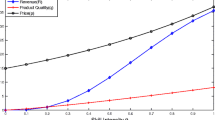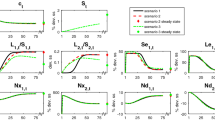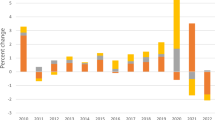Abstract
We use a general equilibrium model of trade to show that technical improvement may indeed cause a fall in the wages of unskilled workers. Under some modest conditions, the wages of skilled workers may go down too.
Similar content being viewed by others
Notes
Without loss of generality, we assume that technical progress is limited to the importable sector. One could show that the implications of technical improvement in the exportable sector are the opposite.
This simplifying assumption states that capital does not impact the marginal productivity of unskilled labor. The assumption is not far from the real world observation as many studies point out this observation. It is argued that the recent increases in the stock of capital through the computer revolution had little or no impact on unskilled labor.
References
Batra R, Scully GW (1972) Technical progress, economic growth, and the north-south wage differential. J Reg Sci 12:375–386
Beladi H, Batra R (2004) Traded and nontraded goods and real wages. Rev Dev Econ 8:1–14
Chao C-C, Yu ESH (2002) Immigration and welfare for the host economy with imperfect competition. J Reg Sci 42:327–338
Cline WR (1997) Trade and income distribution. Institute for International Economics, Washington, D.C.
Jones RW (2005) Immigration vs. outsourcing: effects on labor markets. Int Rev Econ Finance 14:105–114
Jones RW (2003) Joint outputs and real wage rates. Int Rev Econ Finance 12:513–516
Jones RW (1996) International trade, real wages, and technical progress: the specific-factors model. Int Rev Econ Finance 5:113–124
Jones RW, Engerman SL (1996) Trade, technology, and wages: a tale of two countries. Am Econ Rev 86:35–40
Katz LF, Murphy KM (1992) Changes in relative wages, 1963–1987: supply and demand factors. Q J Econ 107:35–78
Kemp MC (1969) The pure theory of international trade and investment. Prentice-Hall, New Jersey
Leamer EE (1992) Wage effects of a U.S.–Mexican free trade agreement. NBER Working Paper 3991. NBER, Cambridge
Wood A (1997) Openness and wage inequality in developing countries: the latin american challenge to east asian conventional wisdom. World Bank Econ Rev 11:33–57
Wood A (1994) North-south trade, employment and inequality: changing fortunes in a skill-driven world. Oxford University Press and Clarendon Press, Oxford and New York
Yu ESH (1979) On the theory of international wage differentials and technical changes. J Reg Sci 19:245–256
Acknowledgements
We are grateful to the Editor and an anonymous referee for helpful comments on an earlier version of this paper. We are responsible for any possible remaining errors.
Author information
Authors and Affiliations
Corresponding author
Rights and permissions
About this article
Cite this article
Oladi, R., Beladi, H. Non-traded Goods, Technical Progress and Wages. Open Econ Rev 19, 507–515 (2008). https://doi.org/10.1007/s11079-007-9057-1
Published:
Issue Date:
DOI: https://doi.org/10.1007/s11079-007-9057-1




